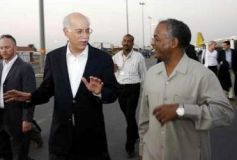US softens stance towards Khartoum over Darfur
Jan 8, 2007 (WASHINGTON) — The United States eased back from threats to take coercive action against Sudan over its failure to allow the deployment of UN peacekeepers to Darfur, saying Khartoum was not solely at fault for the lack of progress on the issue.
 US officials had earlier warned Khartoum that if deployment of the UN-led peacekeeping force was not underway by January 1, they would turn to an unspecified “Plan B” of tough measures believed to include sanctions and the imposition of a no-fly zone over Darfur.
US officials had earlier warned Khartoum that if deployment of the UN-led peacekeeping force was not underway by January 1, they would turn to an unspecified “Plan B” of tough measures believed to include sanctions and the imposition of a no-fly zone over Darfur.
But State Department spokesman Sean McCormack on Monday said it was still too early to take such action.
“We are thinking about what happens if this current set of diplomatic tactics doesn’t work, but we’re not prepared at this point to talk about” those measures, he said.
Last month the US envoy to Sudan, Andrew Natsios, laid out a series of steps Khartoum needed to take by January 1 to avoid coercive measures to halt violence in Darfur, which has left at least 200,000 people dead and 2.5 million displaced over the past four years.
The measures included formal acceptance in writing from President Omar al-Beshir of a UN plan to deploy a joint UN-African Union peacekeeping force of some 20,000 troops to Darfur.
Sudan also had to allow about 70 UN officers and logistics experts into Darfur, to be followed by a second phase deployment of around 1,000 command staff to the region.
While Beshir confirmed his acceptance with the overall plan in a letter delivered December 26 to then-UN secretary general Kofi Annan, he stopped short of agreeing to specific troop numbers and none of the advance UN staff have yet deployed to Darfur.
McCormack said logistics problems rather than obstruction by Khartoum were to blame for the failure to get the US staff into place.
“There’s another half to this, and that is the UN being ready to actually deploy and get its preparations ready,” McCormack said, explaining that the first 70 UN officials had gone into Darfur but had to return to the capital because their base was not ready.
“I don’t think that that was one that we could put on the Sudanese government,” he said.
The UN has also not yet contacted Khartoum about the second phase deployment of 1,000 command staff, he said.
“I don’t think the international system has yet tested them on phase two,” he said.
“So the bottom line is the process is moving forward slowly, in incremental chunks. And certainly we wish that it would go forward faster, but it isn’t,” he said.
As part of the diplomatic pressure, Natsios was this week in China, the biggest buyer of Sudanese oil and a key player in the country’s economy.
“He’s talking to the Chinese, because the Chinese … have some leverage with the Sudanese because of their commercial relationships,” McCormack said.
(AFP)
